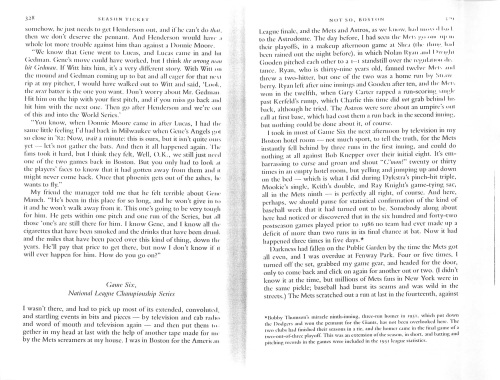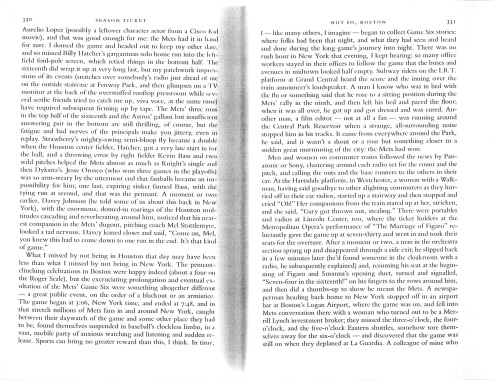In 1986 the New York Mets won it all: their division, the league championship, the World Series, and the entire City of New York. This had as much to do with the success of the team that year as it did with the colorful personalities that made up the ’86 Mets. I wasn’t quite the baseball fan back then that I am now so my memories of the ’86 Mets are fuzzy at best. What I remember most about the team are the individual players — their names, positions, and on some level their quirks or trademarks. Back then there wasn’t much in the way of cable television and most of the Met games were shown on network TV (it was Channel 9, WWOR, when I was watching) so even casual television watchers came to learn something about the Mets. At school, I recall the teachers combining classes and wheeling in a TV so the kids could watch the Met games although I suspect it was more for the teachers than anyone else.
I don’t know how much the 2015 Mets resemble the ’86 Mets. I suspect not much although I think that’s more a product of generational differences than any lack of character on the part of today’s team. Players today are more polished and guarded and it’s hard to tell what they’re really like off-the-field.
On-the-field is a whole different story. And that’s perhaps where this year’s team is most similar to the one from ’86. Both had a flair for the dramatic — whether intentional or not. This year’s baseball dramatics came late for the Mets but it came with a bang, a pop, and most recently, a crunch, as in Utley’s slide/tackle and Tejada’s broken leg. The ’86 Mets too had their share of on-the-field drama, the most memorable moment from that year being Mookie Wilson’s groundball that went through Bill Buckner’s legs during the 10th inning of Game Six of the World Series. In describing the misplay afterwards, Buckner said “The ball went skip, skip and didn’t come up. The ball missed my glove. I can’t remember the last time I missed a ball like that, but I’ll remember that one.”
I realize as I am writing this that the season isn’t over for the Mets — not yet at least. That may change come Thursday when they play the decisive game of the divisional series in LA against the Dodgers. I wish them well.
In the meantime, here’s some inspirational reading for all those Met fans out there. It’s a piece by the great sportswriter Roger Angell about Game Six of the 1986 National League Championship series between the Mets and the Astros, a sixteen inning affair that ended with a Met victory and the entire City of New York on the brink of pandemonium.





